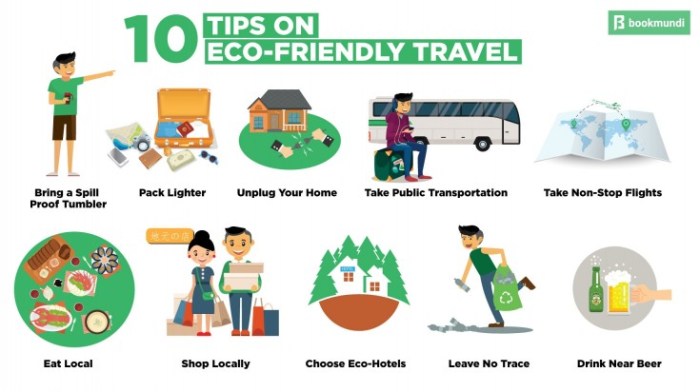Eco-friendly travel tips – Embark on an eco-friendly travel journey, where every step you take leaves a positive impact on the planet. Discover how to minimize your environmental footprint while immersing yourself in unforgettable experiences.
From choosing sustainable transportation options to supporting local businesses, this comprehensive guide empowers you to travel responsibly and make a meaningful difference.
Transportation

Choosing eco-friendly transportation options is a great way to reduce your carbon footprint while traveling. Here are some tips to help you get around in a more sustainable way:
Public Transportation
Public transportation is a great option for getting around cities and towns. It’s often more affordable than taxis or ride-sharing services, and it helps to reduce traffic congestion and pollution.
Walking and Biking
Walking and biking are great ways to get exercise and explore your surroundings. They’re also zero-emission forms of transportation, so they’re good for the environment.
Air Travel
Air travel is a major source of greenhouse gas emissions. If you can, try to avoid flying whenever possible. If you must fly, consider offsetting your carbon emissions by purchasing carbon credits.
To embark on an eco-friendly escapade, consider sustainable practices such as reducing carbon footprint and supporting local communities. If you’re seeking budget-friendly options for your family getaway, explore budget family vacations that prioritize affordability and environmental consciousness. By embracing eco-friendly travel tips, you can create lasting memories while minimizing your impact on the planet.
Alternatives to Air Travel
There are a number of alternatives to air travel that are more eco-friendly. These include:
- Train travel
- Bus travel
- Carpooling
- Driving an electric car
Accommodation
Choosing eco-friendly accommodations can significantly reduce your environmental impact while traveling. Look for hotels or guesthouses that prioritize sustainable practices, such as energy efficiency, water conservation, and waste reduction.
Energy-Efficient Appliances
Energy-efficient appliances, such as LED lighting, low-flow showerheads, and Energy Star-rated appliances, can significantly reduce energy consumption and lower your carbon footprint.
Sustainable Building Practices
Sustainable building practices involve using eco-friendly materials, optimizing natural light and ventilation, and incorporating renewable energy sources like solar panels. These practices minimize the environmental impact of the building’s construction and operation.
Supporting Local Businesses
Supporting locally-owned guesthouses and homestays not only benefits the local economy but also reduces the environmental impact associated with large hotel chains. Local businesses often have a vested interest in preserving the local environment and promoting sustainable practices.
Food and Drinks
Eco-friendly travel extends to the food and drinks we consume. Making sustainable choices not only supports local economies but also minimizes our environmental impact.
One significant aspect is reducing meat consumption. Animal agriculture contributes heavily to greenhouse gas emissions, water pollution, and deforestation. Opting for plant-based meals or reducing meat intake can make a substantial difference.
Supporting Local Farmers and Markets
By supporting local farmers and markets, we contribute to sustainable agriculture practices that preserve biodiversity, reduce transportation emissions, and promote fair trade.
- Local produce often requires less packaging and transportation, reducing waste and emissions.
- Supporting small-scale farmers ensures fair compensation and promotes traditional farming methods.
- Farmers’ markets provide opportunities to connect with producers and learn about sustainable practices.
Activities and Experiences
Engage in eco-friendly activities that respect local ecosystems and cultural traditions. Embrace responsible tourism practices to minimize your environmental impact and support sustainable development.
Preserve the integrity of natural environments by choosing activities that adhere to conservation principles. Avoid harmful practices that can disrupt wildlife, damage habitats, or pollute ecosystems.
When embarking on your next adventure, consider implementing eco-friendly travel tips to minimize your environmental impact. These practices not only benefit the planet but also enhance your travel experience. Whether you’re exploring the vibrant coral reefs of scuba diving locations or immersing yourself in lush rainforests, responsible tourism ensures the preservation of these natural wonders for future generations.
Supporting Local Communities, Eco-friendly travel tips
- Patronize local businesses and services to support the economic well-being of the community.
- Engage with local guides and experts to gain insights into the region’s history, culture, and traditions.
- Participate in community-based tourism initiatives that empower local residents and promote cultural exchange.
Preserving Cultural Heritage
- Respect local customs and traditions to preserve the authenticity of cultural heritage.
- Visit historical sites and monuments with a respectful demeanor, adhering to any guidelines or restrictions.
- Support organizations dedicated to the preservation and promotion of cultural heritage.
Packing and Gear
Eco-friendly packing and gear are essential aspects of sustainable travel. By packing light and choosing reusable items, you can significantly reduce waste and minimize your environmental impact.
One of the key principles of eco-friendly packing is to avoid single-use plastics. Instead, opt for reusable alternatives such as water bottles, food containers, and shopping bags. These items can be used multiple times, eliminating the need for disposable plastics that end up in landfills or oceans.
When embarking on your travels, consider adopting eco-friendly practices to minimize your environmental impact. From choosing sustainable transportation options to reducing plastic waste, small actions can make a big difference. While exploring different cultures, don’t miss the opportunity to immerse yourself in the vibrant best cultural festivals worldwide.
These events offer a glimpse into local traditions and provide a platform for cultural exchange. As you continue your travels, remember to prioritize eco-conscious choices to protect the beauty of our planet for generations to come.
Ethical Sourcing and Sustainable Brands
When selecting gear and clothing for your travels, consider ethical sourcing and sustainable brands. Look for companies that prioritize environmental responsibility, use eco-friendly materials, and ensure fair labor practices. By supporting sustainable businesses, you contribute to a positive impact on the planet and its people.
Additional Tips
In addition to the specific tips Artikeld above, there are several general practices that can help you minimize your environmental impact while traveling.
One important aspect of eco-friendly travel is being mindful of your consumption and waste. This means avoiding single-use plastics, packing light to reduce transportation emissions, and choosing products that are made from sustainable materials.
Offsetting Your Carbon Footprint
Even with the best efforts to reduce your environmental impact, some emissions are unavoidable. One way to compensate for these emissions is to offset your carbon footprint. This involves investing in projects that reduce greenhouse gas emissions, such as renewable energy projects or reforestation efforts.
Ultimate Conclusion

Embrace eco-friendly travel as a way of life, leaving behind a legacy of preservation and sustainability. By making conscious choices and supporting responsible practices, you become an ambassador for a greener, more vibrant world.
Question Bank: Eco-friendly Travel Tips
What are the benefits of choosing eco-friendly transportation options?
Reducing carbon emissions, supporting sustainable practices, and promoting healthier communities.
Why is it important to support local businesses when traveling?
To preserve cultural heritage, boost local economies, and minimize environmental impact.
How can I reduce waste while packing for a trip?
Pack light, use reusable items, avoid single-use plastics, and opt for sustainable brands.